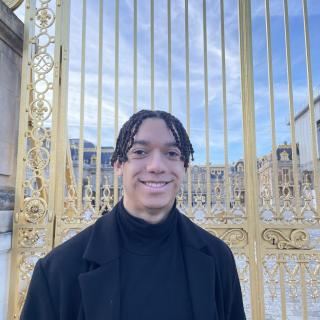Meet Matthew Stevenson (IES Abroad London, Fall 1974, and IES Abroad Vienna, Spring 1975 | Bucknell University), an author who travels the world from his home base in Switzerland, writing books about the fascinating historical moments of the countries he visits. How did he get here? Read on to find out how his experiences with IES Abroad in London and Vienna inspired his move back abroad and his career as a travel writer.
IES Abroad: As an undergrad at Bucknell University, what led you to study abroad for a year, first in London and then in Vienna?
Matthew Stevenson (MS): My undergraduate major was Political Science, and the idea of a semester taught by the professors at the London School of Economics is what most excited me. The semester began with 10 days in Oxford, then we had two and a half months in London, and we ended the term with two weeks in Freiburg, Germany.
For me, it was Professor Edward Mowatt who made that semester sing. He organized the classes and seminars, told us about lectures at LSE, arranged for us to buy the required reading at Foyle’s in Charing Cross, and dealt with whatever difficulties 20-year-old Americans abroad can fall into. It was Edward, at the end of the London semester (when I didn’t want to return to the wilds of central Pennsylvania), who arranged for me to attend IES Abroad Vienna.
I arrived early in Vienna and they assigned me to a room in a baroness’s apartment opposite the Spanish Riding School. I heated the room with coal shoveled into a ceramic stove (left over from the Hapsburg presence) and walked each day to classes at the Palais Kinsky. One of our classes featured learning how to waltz! I loved the academic classes, which centered on East European History and Politics, but also German and Art History, and a delightful Psychology course with Frau Doktor Doris Leichleitner, with whom I remained friends for the rest of her life.
I didn’t know it at the time, but for much of the rest of my life, I would live abroad. The Dean in Vienna, Clarence Giese—a man of many graces, intellect, humor, and artistic inspiration—said on one occasion, “When I moved abroad, I discovered I could love two countries at the same time. And our hope is that you keep a part of Austria within you after you leave.” Clarence and Alberta Giese, who helped found IES Abroad back in 1950, both passed away within the last couple of years, and they are a part of the Austria that I will keep with me, always.
IES Abroad: What are some of your most impactful study abroad memories?
MS: From London I have abiding memories, not just of the capital city, but of the books we read in classes—about the decline of so-called “liberal Britain” and the coming of the European Union. We received library cards to the Senate House Library, and I spent many happy hours there, discovering books and authors who were new to me.
Vienna was a less-specific program—more liberal arts-focused. There, I learned that I could live on my own in a foreign culture; sometimes under difficult circumstances. After the semester, I traveled some behind the Iron Curtain, including to Russia, and I often thought back to a class that IES Abroad Vienna Professor Max Peyfuss taught about underground literature in the East.
IES Abroad: Where did your career take you after graduating? How did the skills you learned abroad transfer to your professional life?
MS: After leaving Vienna and finishing at Bucknell, I got a master’s degree in International Affairs from Columbia University in New York, and I worked as an editor for Harper’s Magazine and in the international division of the Bank of New York.
Even in those New York years, I was still dreaming of life abroad. Whenever I had vacation time I would head to Europe, the Middle East, or Asia. The great adventure of that time in my life was a round-the-world trip that began in Korea and continued through to Japan, Hong Kong, Thailand, India, and Pakistan. I paid for it by writing a series of political and travel articles about the places I was seeing. It reminded me very much of what I had done at IES Abroad in London and Vienna.
IES Abroad: In 1991, you moved to Switzerland to work in international finance, and afterward, you stayed to write your travel and history books. How did you decide to move and stay abroad?
MS: I was offered a job in Switzerland for two years, which turned into 15! Afterward, my wife and I (and our four children) decided that we still liked living in Switzerland and that there was more of the world to see from central Europe.
Part of the reason that we stayed on so long is that our children went to the local public schools in Geneva, and they flourished, which made the decision to stay easier. It’s possible that, professionally, I might have lost something by becoming an expatriate of such long standing—it’s hard to say—but what I gained was having trilingual children, and being able to continue my reading, writing, and travels to such places as the Middle East and Eastern Europe.
A recent book of mine, Reading the Rails, is about taking trains from Europe to Eastern Europe, in particular when my son Charles and I rode the trains to then-peaceful Damascus. These are not connections found on Amtrak!
IES Abroad: How did you prepare to become an author? Have your own travel experiences inspired any of the books?
MS: I am sure my interest in writing about history and travel crystalized when I was studying in London with Edward Mowatt, and later in Vienna with Clarence Giese. What I learned abroad in those years is that I could write in a style that was my own.
My books tend to read like long letters home, and when you lived in Europe in the 1970s, as an IES Abroad student, you had neither email, WhatsApp, or any way to telephone home. In that entire year, I never called home. Rather, I wrote about five hundred letters home to my parents, friends, and family. I spent my IES Abroad evenings and weekends banging out the letters on an Olympia typewriter that I dragged over to London and then to Vienna. The books that I write today are similar to these letters home.
IES Abroad: What impact do you hope to have on your readers? Can you tell us the names of some of your books and the places that you write about?
MS: My first book was Letters of Transit: Essays on Politics, History, Economics, and Family Life Abroad, inspired by IES Abroad reading lists in Vienna and London. It’s a collection of essays, and some of the subjects include the Russian economy, the war in Yugoslavia, the battle for Guadalcanal (in World War II), and our reasons for deciding to raise our children without the intrusion of television.
My most recent book is called Appalachia Spring, and it’s about a drive through the coal countries of Virginia, Kentucky, and West Virginia. An April Across America is about a transcontinental journey from New York to Los Angeles, and Whistle-Stopping America takes place in South Dakota, Texas, and Virginia at well-known historical sites. A forthcoming book about the Midwest is called Playing in Peoria.
Right at the moment, I am typing these answers in Buon Ma Thuot, which is a small city in the Central Highlands of Vietnam. I am writing the conclusion to a book about the Indochina Wars that were fought in Laos, Cambodia, and Vietnam from the late 1940s until the 1980s (and maybe beyond). Vietnam is a hard country in which to travel, and to see historical places takes some perseverance. On this occasion, I am here with my folding Brompton bicycle, which I am riding between sites of the Vietnam War.
You can find all my books on Amazon and www.matthewmstevenson.com.
IES Abroad: Do you have any advice for students considering studying or interning abroad?
MS: I admire the academic rigor and intellectual honesty of IES Abroad and its programs. They are serious programs taught by some of the best professors in the world. Yes, for sure, you will enjoy being abroad and being in new cultures, but to get the most out of a study abroad program, have a look at the subjects you will be studying or the professors in the programs, and make sure that they fit in with your goals and dreams.
I am in favor of studying wherever and whenever you can, and little is grander in life than a well-crafted semester abroad—of which IES Abroad has some 135 programs in 33 locations (a statistic that boggles my mind, as in the 1970s, it had about five centers). But there is something magical about a full year program, beginning the year in London and ending it in Vienna as it was for me. Think about it!
IES Abroad: What's next for you?
In an immediate sense, I have to get the bicycle and myself from Buon Ma Thuot and Dalat down to Bien Hoa, which is in the industrial suburbs of Saigon and was the site of a large American air base during the Vietnam War. Some of the way, I will ride my bike. In other parts, I will hitch rides in minivans or take a bus or train. Then back in Saigon, before heading home, I need to find some locations around the city associated with the war’s end in 1975.
Biking in Saigon is a bit like being an atom in a nuclear reactor, but my bike-handling skills (following on the wheels of weaving scooters) are improving. Then, to understand what I will have seen, I need to read three books (for my homework?) that I have downloaded to my Kindle, including a sweeping history by Sir Max Hastings called Vietnam: An Epic Tragedy, 1945-1975. Is this the life a permanent junior living and studying abroad? It might well be, and I am thankful for it.
Learn more about studying abroad in London and Vienna, and check out all of our Alum of the Month profiles to see real examples of how study abroad changed the lives and careers of our former students. Give more students the opportunity to study abroad by supporting scholarships.





